)
Since 2020, new work trends have emerged in the finance function. To track these emerging trends, we partnered with YouGov and asked over 1,000 finance professionals from France, Germany, and the United Kingdom about their views on the future of work in finance. Topics include the current economic environment, flexible working conditions, and all things remote work.
Want to read the full report? You can find it here.
Is the future of work 100% remote?
Working from home became a lifeline for employees and companies during the height of the pandemic when offices were closed. As offices opened back up, remote-friendly tools and policies remained in place for many companies.
Remote work satisfaction
A large swath of employees are still working remotely at least partially, and some even consider remote work opportunities a baseline requirement when looking for a new job. Overall, employees who responded to the survey seem to be happy with their current remote work options.
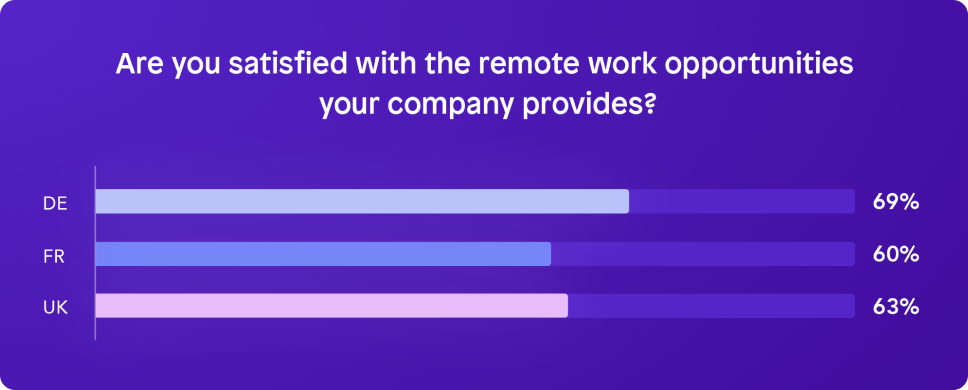
The popularity of remote work does not necessarily mean that it’s an error-proof solution or a cure-all to post-pandemic woes. Employees still encounter communication issues or other obstacles that block their ability to work remotely with 100% efficiency.
Inefficient communication
While the majority of survey respondents reported they are happy with their remote work situation, there are still gaps in accessibility. 30% of employees surveyed across the three regions stated that they encounter obstacles while working remotely, especially in areas of communication.
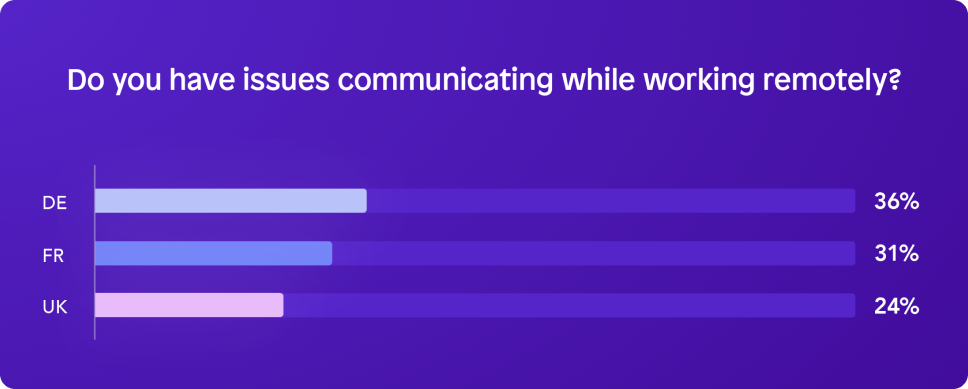
Remote work policies and tools have a ways to go before they can be entirely foolproof and universally adopted. Managers may need to make more of an effort to ensure smooth communication within teams and across departments, especially if there are remote-based team members.
Remote work and compensation
Remote work roadblocks aren’t just related to communication. In fact, due to the growing trend of remote work flexibility as a key benefit for employees, employers must navigate the ensuing social implications.
Should location determine salary?
One of the survey’s most interesting findings revolves around salary.
Salary can help offset the costs of commuting and living expenses, especially in expensive areas and big metropolitan cities. So what happens when an employee no longer commutes to and from the office, or moves to a less expensive region where cost of living is lower, and works 100% remotely?
When asked if employees who work entirely remotely should be paid less, almost one-third of survey respondents thought they should.
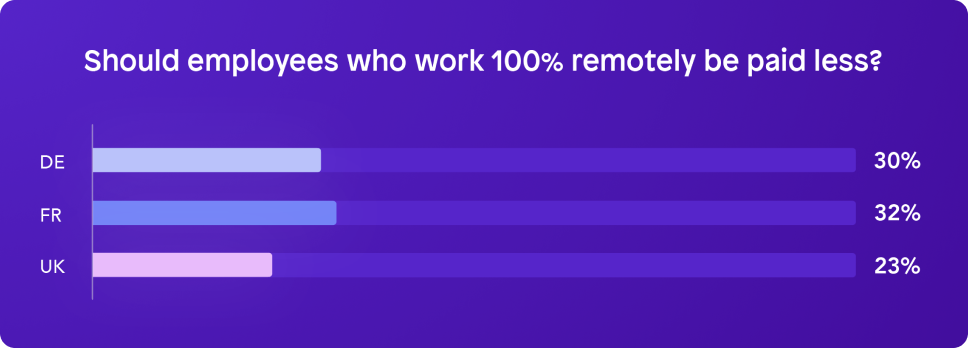
This is something that company leaders must be aware of. Remote work flexibility could perhaps lead to negative feelings around who is present in the office and who works remotely.
Finance and HR managers should work closely together to define these policies and make sure that employees’ situations are equitable.
To learn more about finance industry salaries around the world, read our CFO Salary Benchmark.
Budgeting for remote work
Another unintended consequence of remote work: employees incurring greater costs at home. Despite the widespread popularity of remote work, only an average of 10% of respondents said that their company allocates a budget for home office setups.
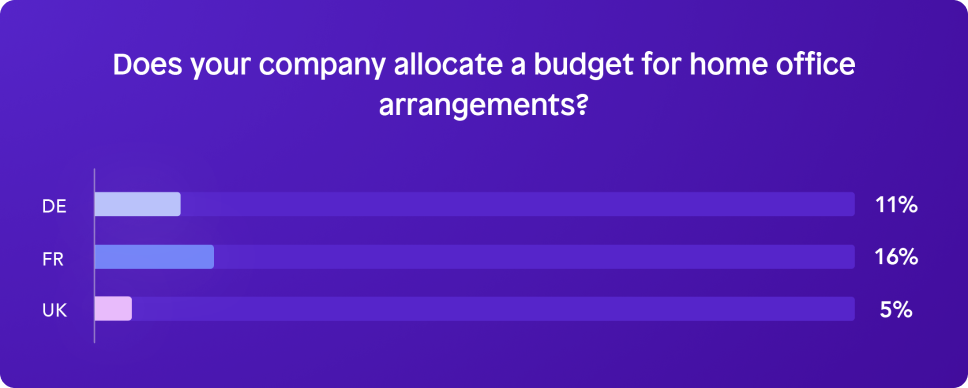
Many companies implemented temporary home office budget allowances or stipends when the pandemic hit. But those allowances have not continued, for the most part.
Leaders should put policies in place that address remote work in granular detail. Decide if location will influence salary, or if the same role will be paid the same no matter where the employee lives. Define spending policies for remote employees and their home office setup. This way, you can manage expectations and nobody is in for an unwelcome surprise.
Inflation: how should employers respond?
Something that is top of mind for both company leaders and employees right now is the macroeconomic environment. Specifically, economic downturn and rising inflation. To counter rising inflation, some companies (but not a majority) across France, Germany, and the UK plan to increase compensation.
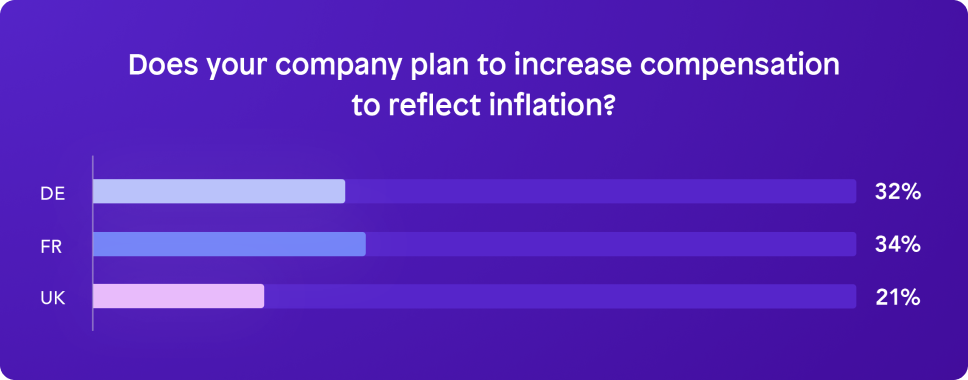
As time goes on, these answers may change. The economic landscape is shifting daily, and companies may be holding out for an upturn before promising employees an increase in compensation.
The four-day work week: gaining popularity
The idea of the four-day work week is gaining traction. Many professionals feel that a four-day work week would improve their work-life balance. Some UK companies have started trials of the four-day week and the general consensus is that it’s going well.
Our survey asked finance professionals if they were interested in working four days per week rather than the traditional five. They seem to be keen for this benefit, as evidenced by their answers in our survey.
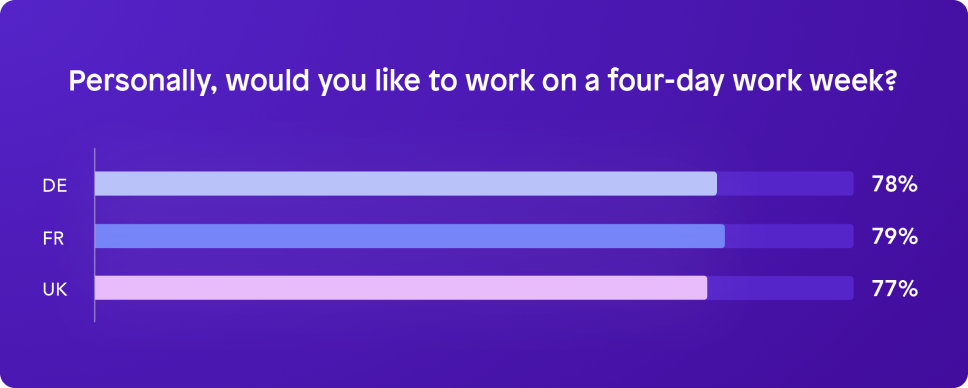
An overwhelming majority of respondents would like to work four days a week.
Of course, just because employees want this benefit doesn’t mean that employers are going to implement it. We actually see a large discrepancy between employees who state that they are interested in a four-day work week (above) as opposed to those who say their companies are actually considering it:
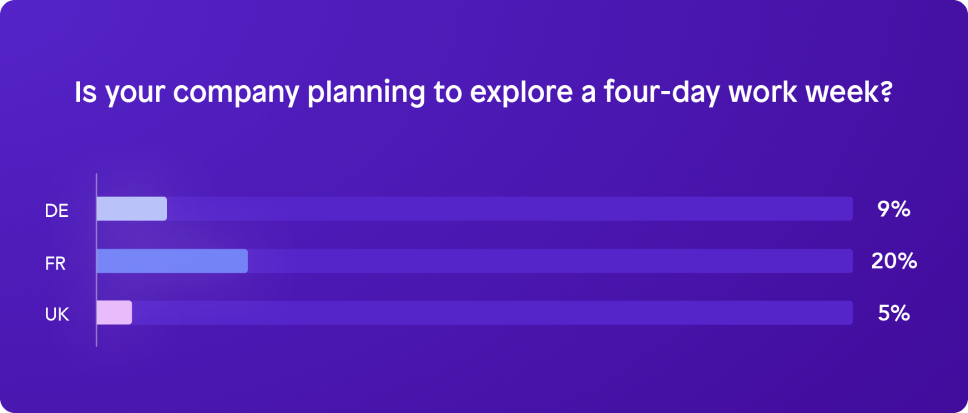
Company leaders may be waiting for more study results or other external factors to nudge them in one direction or the other before announcing to employees that they will consider exploring a four-day work week.
In any case, the four-day work week still remains a dream for many employees. However, if the trend continues and studies show that there’s no impact on productivity or bottom line, more companies may be willing to adopt the four-day work week.
Emerging work trends in finance: what’s next?
The future of finance work can be summed up in one word: flexible. Flexible working arrangements are a growing priority for UK employees, according to a LinkedIn study.
Flexibility is key for keeping finance professionals happy. Employees are eager to continue working remotely and explore the four-day work week, which highlights their appetite for flexible working conditions. Employers will need to think of creative and flexible solutions to help employees if high inflation continues.
While there are still kinks to work out in terms of remote work, it’s clearly here to stay. Finance and HR leaders should act quickly to put policies in place that encourage flexible work habits that keep employees connected, no matter where they’re working from.
Read our full report on finance professionals’ feelings about the future of work here: Future of finance work.
)

)
)
)
)
)
)